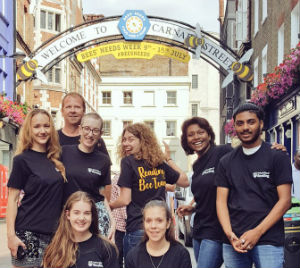Hive of activity to raise awareness of Bees' Needs
09 July 2018

Shoppers in London’s West End can get a glimpse into the secret lives of bees this week, as University of Reading experts join a national campaign hitting the streets of the capital.
Scientists and officials have swarmed to Carnaby Street – renamed ‘Carnabee Street’ – for Bees’ Needs Week, a campaign run by the Department of Environment, Food and Rural Affairs to raise awareness of the threat bees worldwide.
A variety of public activities, games and installations will be in the street from Monday 9 July to Sunday 15 July. Around a dozen Reading scientists are showcasing their leading research and a Bumblearium has been installed allowing people to see real bees at work.
Dr Deepa Senapathi, Research Fellow in the University of Reading’s School of Agriculture, Policy and Development, said: “Scientists at the University of Reading have been working for years finding evidence to show why our pollinators are declining. But doing something about this requires action from everyone, from governments to individuals. Reading’s Bee Team is committed to playing a full role in saving pollinators around the world for everyone’s future. That’s why we’re here supporting Bees’ Needs Week and getting the public on board with our mission.”
Pressure
Pollinators face a range of pressures, from habitat loss to pests and diseases, which also threatens the UK’s £100bn food industry. Reading scientists led by Professor Simon Potts, who has authored reports for the UN on the challenges faced by pollinators, are working to explore how we can support them, through methods like improving land management.
Bees’ Needs Week is part of the National Pollinator Strategy, a 10 year plan which sets out how the Government, beekeepers, conservation groups, farmers and researchers can work together to improve the status of around 1,500 pollinating insects in England. It prioritises the management and creation of wildlife-rich habitat, raising awareness, managing bee health and strengthening the evidence base.
Bees and other pollinators are vital to growing our food and contributing to our biodiversity. Some 75% of global food crops and nearly 90% of wild flowering plants depend at least to some extent on animal pollination. Pollinators are worth about £1/3 trillion to global food production each year.
"It is inspiring to see such a wide range of organisations celebrating these essential creatures for this unique Bees’ Needs campaign" - Michael Gove MP
Lord John Parliamentary, Defra Minister for Rural Affairs and Biosecurity, attended Carnabee Street for Monday’s launch. He said: "Bees’ Needs Week is about celebrating the fact that everyone can get involved by growing more flowers, leaving patches of garden to grow wild, cutting grass less, not disturbing insect nests, and thinking carefully about using pesticides."
Environment Secretary Michael Gove said: "Bees and other pollinators are vital contributors to the beauty of our landscapes, our economy and our £100 billion food industry. It is inspiring to see such a wide range of organisations celebrating these essential creatures for this unique Bees’ Needs campaign - showing us that all of us can play a part and help pollinators to thrive."
Defra has partnered with West End shopping and dining destination Carnaby London for Bees’ Needs Week, bringing together action from government, conservation groups, industry and retailers.
For more information on Bees’ Needs Week, events, and how you can get involved, visit www.bumblebeeconservation.org/bees-needs
Follow #BeesNeeds on twitter to find out more about the campaign and tweet your pollinator questions to charities, businesses and bee experts.
